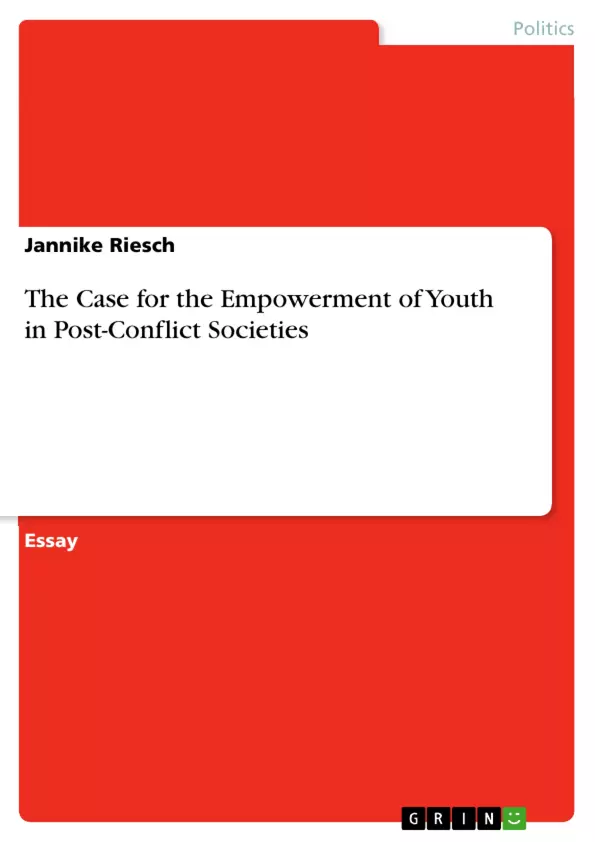Within this essay, I will answer the question as to why it is important to empower youth in post-conflict societies. In order to do so, I will first engage in the theoretical framework, for example the definitions of youth and peacebuilding. After that, I will make the case in favor of the empowerment of youth by looking at 1) the very nature and characteristics of the social category that is youth and 2) the practical considerations that speak for empowering youth. In order to illustrate my argument, I will then point out why it is important to focus on youth in the exemplary case of post-conflict Bosnia and Herzegovina (BiH). Lastly, in the concluding remarks, I will consider what implications the findings might or should have for the future of youth in post-conflict societies.
On the 9th of December 2015, the United Nations Security Council (UNSC) unanimously adopted a resolution. With that, the UNSC did not only acknowledge the potential of young people as active and positive contributors to peace and stability; it also tried to open up more possibilities in order to further empower youth to take part in the political processes within their respective countries.
While so far young people have often been marginalized in post-conflict settings and their potential to contribute to the creating or maintaining of peace has mostly been overlooked, Resolution 2550 sets a new focus and thus seems to mark a shift in the perception of youth. Youth’s potential in becoming active and positive agents of building peace remains untapped if they are marginalized both in the academic and political context. Thus, the main aim of this essay is to show why it is of crucial importance to change the perception of youth in post-conflict societies and empower them to make a difference.
Table of Contents
- Introduction
- Theoretical Framework: Definitions of Youth and Peacebuilding
- On the Nature of Youth
- Openness
- Future-Orientation
- Practical Considerations for the Empowerment of Youth
- The Case of Bosnia and Herzegovina (BiH)
- Concluding Remarks
Objectives and Key Themes
This essay aims to demonstrate the significance of empowering youth in post-conflict societies. It examines the unique characteristics of youth and how they contribute to peacebuilding efforts. The essay explores practical considerations for youth empowerment and analyzes the specific case of post-conflict Bosnia and Herzegovina (BiH).
- The definition and nature of youth in post-conflict contexts
- The importance of youth engagement in peacebuilding
- The unique qualities and perspectives of youth that make them valuable peacebuilders
- Practical strategies for empowering youth in post-conflict societies
- The role of youth in promoting reconciliation and rebuilding relationships in post-conflict settings
Chapter Summaries
The Introduction outlines the growing recognition of youth's crucial role in preventing and resolving conflicts, citing UN Security Council Resolution 2250. It highlights the demographic weight of youth in developing countries, especially those affected by conflict.
The "Theoretical Framework" section discusses the complexities of defining "youth" and "peacebuilding," highlighting different approaches and perspectives.
The "On the Nature of Youth" chapter delves into the characteristics of youth that make them particularly conducive to peacebuilding. It focuses on openness and future-orientation, arguing that youth's lack of entrenched biases and their focus on the future allows them to approach peacebuilding with fresh perspectives and idealism.
The chapter on "Practical Considerations for the Empowerment of Youth" explores strategies and initiatives designed to empower youth in post-conflict settings. It analyzes the practical implications of involving youth in decision-making processes and creating opportunities for them to contribute to peacebuilding.
The "The Case of Bosnia and Herzegovina (BiH)" chapter provides a specific example of how youth empowerment can be crucial in a post-conflict setting. It explores the unique challenges and opportunities for youth in BiH, illustrating how their involvement is essential for successful reconciliation and peacebuilding.
Keywords
This essay focuses on the role of youth in post-conflict societies, highlighting the concept of youth empowerment, peacebuilding, reconciliation, and the importance of involving youth in decision-making processes. Key themes include the unique characteristics of youth, their potential to contribute to peacebuilding, and the challenges and opportunities they face in post-conflict settings.
Frequently Asked Questions
Why is it important to empower youth in post-conflict societies?
Youth empowerment is crucial because young people are active contributors to peace and stability. Marginalizing them leaves their potential untapped, whereas involving them ensures long-term reconciliation and societal rebuilding.
What is UN Security Council Resolution 2250?
Adopted in 2015, this resolution officially recognizes the positive role young people play in maintaining international peace and security and encourages their participation in political processes.
What unique characteristics make youth effective peacebuilders?
Youth often possess a high degree of openness and a strong future-orientation. Their lack of entrenched historical biases allows them to approach peacebuilding with fresh perspectives and idealism.
How does the case of Bosnia and Herzegovina (BiH) illustrate youth empowerment?
In BiH, a society recovering from deep ethnic conflict, youth involvement is essential to break cycles of division and foster a shared future, moving beyond the entrenched grievances of older generations.
What are practical strategies for empowering youth?
Strategies include involving youth in formal decision-making processes, creating educational opportunities focused on peace, and supporting youth-led initiatives for social and political change.
- Citar trabajo
- Jannike Riesch (Autor), 2017, The Case for the Empowerment of Youth in Post-Conflict Societies, Múnich, GRIN Verlag, https://www.grin.com/document/462238



